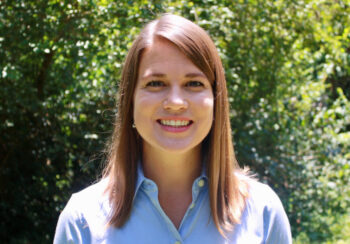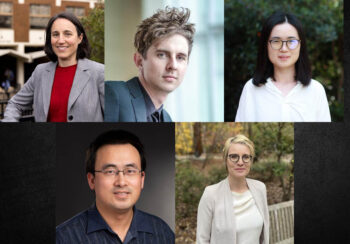Five University of Georgia early-career faculty have been recognized in 2023 by the National Science Foundation’s Faculty Early Career Development Program (CAREER), which rewards faculty who have the potential to serve as leaders in the advancement of research and education.
UGA’s newest awardees include Akram Alishahi (Department of Mathematics), Amanda Frossard (Department of Chemistry), Le Guan (School of Computing), Kevin Vogel (Department of Entomology) and Krystal Williams (Institute of Higher Education).
CAREER Awards, the most prestigious award presented by the NSF to junior faculty, provide five years of funding and are given to only about 500 recipients in the U.S. each year.
Four of five CAREER recipients received support for their proposals from UGA’s Office for Proposal Enhancement (OPE). OPE provides technical and skilled support to faculty developing research proposals for external funding.
“Each March we hold virtual info sessions designed to introduce the program, give structured feedback on proposals, and help faculty determine if they are ready to apply,” said Jake Maas, director of OPE. “By providing in-depth support, we hope to keep increasing the number of CAREER proposals and awards at UGA.”
Williams, an assistant professor in the Louise McBee Institute of Higher Education, was awarded for research that will examine Black undergraduate women’s academic and career-related outcomes in computing sciences (CS). This five-year project will develop educational initiatives to promote public engagement in equity issues regarding Black women in science, technology, engineering and mathematics (STEM).
“Adopting mixed methods to explore national trends concerning this group, the project will capture the voices of Black women and investigate how they describe their experiences preparing for computing professions,” Williams said.
Guan, an assistant professor in the School of Computing, received the award for improving the lifecycle security of microcontrollers, which control embedded systems like implantable medical devices, automobile engine control systems and various other applications.
This research enriches the arsenal of microcontroller units (MCU) firmware security with new knowledge, frameworks, analysis and supporting techniques. Guan expects that his team’s work will help enhance national security and could improve source code developed by all stakeholders: chip vendors, third-party developers and end-product manufacturers.
“This project has the potential to significantly improve the security of the whole software supply chain in the MCU ecosystem,” he said. “We plan to share the results with industry partners and collaborate on prototype testing that will encourage future research in this field.”
Frossard, an assistant professor in Franklin College’s Department of Chemistry, received her award for research on surfactants in atmospheric aerosol particles and their influence on hygroscopicity, or the tendency of a material’s ability to absorb moisture from its environment. An improved characterization of these surfactants, Frossard said, will improve our understanding of atmospheric processes and the growth of particles into cloud droplets.
Alishahi, an assistant professor in the Department of Mathematics, received the award for research in low-dimensional typology, a branch of mathematics that studies manifolds or topological spaces with four or fewer dimensions. Low-dimensional topology has practical implications in such areas as medical imaging and DNA research, physics and materials science, computer graphics and animation, robotics and more.
“This research intends to make mathematics, especially topology, more accessible to a wider audience through various activities,” Alishahi said.
The project will help establish a math program in the Athens-Clarke County public library and arrange summer math camps for middle and high school students. It will also conduct summer research experience projects for undergraduate students and a topology-focused summer school for grad students and postdocs.
Vogel, an assistant professor at the College of Agricultural & Environmental Sciences’ Department of Entomology, received his award for research examining the role of symbiotic bacteria in kissing bugs, which carry the Trypanosoma cruzi bacteria that cause Chagas disease. This project seeks to understand the functions of bacteria inside their host and how the host regulates the microbiome in its gut.
“This is a novel relationship between the kissing bugs and bacteria, as both the host and the microbes can be genetically manipulated, allowing us to precisely target specific genes that underly the symbiosis,” Vogel said.
The project will bring high school teachers to UGA as part of the Georgia Intern-Fellowships for Teachers (GIFT) program. Vogel also plans to develop an educational board game to educate the public about insect-microbe interactions.






